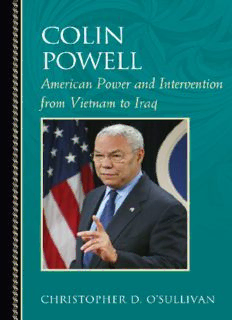
Colin Powell: American power and intervention from Vietnam to Iraq PDF
Preview Colin Powell: American power and intervention from Vietnam to Iraq
Colin Powell Biographies IN AMERICAN FOREIGN POLICY Joseph A. Fry, University of Nevada, Las Vegas Series Editor The Biographies in American Foreign Policy Series employs the enduring medium of biography to examine the major episodes and themes in the his- tory of U.S. foreign relations. By viewing policy formation and implementa- tion from the perspective of influential participants, the series humanizes and makes more accessible those decisions and events that sometimes appear abstract or distant. Particular attention is devoted to those aspects of the subject’s background, personality, and intellect that most influenced his or her approach to U.S. foreign policy, and each individual’s role is placed in a context that takes into account domestic affairs, national interests and poli- cies, and international and strategic considerations. Volumes Published Lawrence S. Kaplan, Thomas Jefferson: Westward the Course of Empire Richard H. Immerman, John Foster Dulles: Piety, Pragmatism, and Power in U.S. Foreign Policy Thomas W. Zeiler, Dean Rusk: Defending the American Mission Abroad Edward P. Crapol, James G. Blaine: Architect of Empire David F. Schmitz, Henry L. Stimson: The First Wise Man Thomas M. Leonard, James K. Polk: A Clear and Unquestionable Destiny James E. Lewis Jr., John Quincy Adams: Policymaker for the Union Catherine Forslund, Anna Chennault: Informal Diplomacy and Asian Relations Lawrence S. Kaplan, Alexander Hamilton: Ambivalent Anglophile Andrew J. DeRoche, Andrew Young: Civil Rights Ambassador Jeffrey J. Matthews, Alanson B. Houghton: Ambassador of the New Era Clarence E. Wunderlin Jr., Robert A. Taft: Ideas, Tradition, and Party in U.S. Foreign Policy Howard Jablon, David M. Shoup: A Warrior against War Jeff Woods, Richard B. Russell: Southern Nationalism and American Foreign Policy Russell D. Buhite, Douglas MacArthur: Statecraft and Stagecraft in America’s East Asian Policy Christopher D. O’Sullivan, Colin Powell: American Power and Intervention from Vietnam to Iraq Colin Powell American Power and Intervention from Vietnam to Iraq Christopher D. O’Sullivan ROWMAN & LITTLEFIELD PUBLISHERS, INC. Lanham (cid:129) Boulder (cid:129) New York (cid:129) Toronto (cid:129) Plymouth, UK ROWMAN & LITTLEFIELD PUBLISHERS, INC. Published in the United States of America by Rowman & Littlefield Publishers, Inc. A wholly owned subsidiary of The Rowman & Littlefield Publishing Group, Inc. 4501 Forbes Boulevard, Suite 200, Lanham, Maryland 20706 www.rowmanlittlefield.com Estover Road Plymouth PL6 7PY United Kingdom Copyright © 2009 Rowman & Littlefield Publishers, Inc. All rights reserved. No part of this publication may be reproduced, stored in a retrieval system, or transmitted in any form or by any means, electronic, mechanical, photocopying, recording, or otherwise, without the prior permission of the publisher. British Library Cataloguing in Publication Information Available Library of Congress Cataloging-in-Publication Data: O’Sullivan, Christopher D. Colin Powell : American power and intervention from Vietnam to Iraq / Christopher D. O’Sullivan. p. cm. — (Biographies in American foreign policy Joseph A. Fry) Includes bibliographical references and index. ISBN 978-0-7425-5186-2 (cloth : alk. paper) — ISBN 978-0-7425-6535-7 (electronic) 1. Powell, Colin L. 2. Generals—United States—Biography. 3. African American generals—Biography. 4. United States. Army—Biography. 5. Statesmen—United States—Biography. 6. United States. Dept. of State—Biography. I. Title. E840.5.P68O885 2009 327.730092—dc22 [B] 2008046759 Printed in the United States of America (cid:2) ™ The paper used in this publication meets the minimum requirements of American National Standard for Information Sciences—Permanence of Paper for Printed Library Materials, ANSI/NISO Z39.48-1992. To my father, Gen. Curtis “Hoop” O’Sullivan (cid:2) Contents Chronology ix Acknowledgments xv Introduction 1 Chapter 1 The Education of a Soldier, 1937–1980 7 Chapter 2 From the Pentagon to the White House, 1980–1987 23 Chapter 3 National Security Adviser at the End of the Cold War, 1987–1989 45 Chapter 4 Chairman of the Joint Chiefs, 1989–1993 71 Chapter 5 The Military and Diplomacy after the Cold War 97 Chapter 6 Secretary of State 125 Chapter 7 Powell, Iraq, and the “Fog of War” 159 Chapter 8 Conclusion 193 Bibliographical Essay 201 Index 209 About the Author 219 vii (cid:2) Chronology 1920 April 26: Luther Powell emigrates from Jamaica. 1929 Luther Powell and Arie marry. 1937 April 5: Colin L. Powell is born in Harlem. 1941 The Powell family moves to the South Bronx. 1943 T he Powells take up residence at 952 Kelly St. in Hunts Point, the Bronx. 1950 September: Powell enters Morris High School. 1954 January: Powell graduates from Morris High School. February: Powell enrolls at City College of New York (CCNY). September: Powell signs up for the Reserve Officers’ Training Corps (ROTC) and pledges Pershing Rifles. 1956 August: Powell is admitted to advanced, upper-division ROTC. 1957 P ower attends a six-week summer encampment at Fort Bragg, North Carolina. 1958 J une 9: Powell becomes a Distinguished Military Graduate and is commissioned a second lieutenant in the regular army. June 10: Powell receives a BS in geology from CCNY. He attends an eight-week basic infantry officer course, Ranger School, and six weeks of airborne training. 1959 January: Powell is a platoon leader in Germany. December: He is promoted to first lieutenant. 1961 J anuary: Powell is stationed at Fort Devens, Massachusetts, as company commander. November: He meets Alma Johnson. ix
Description: